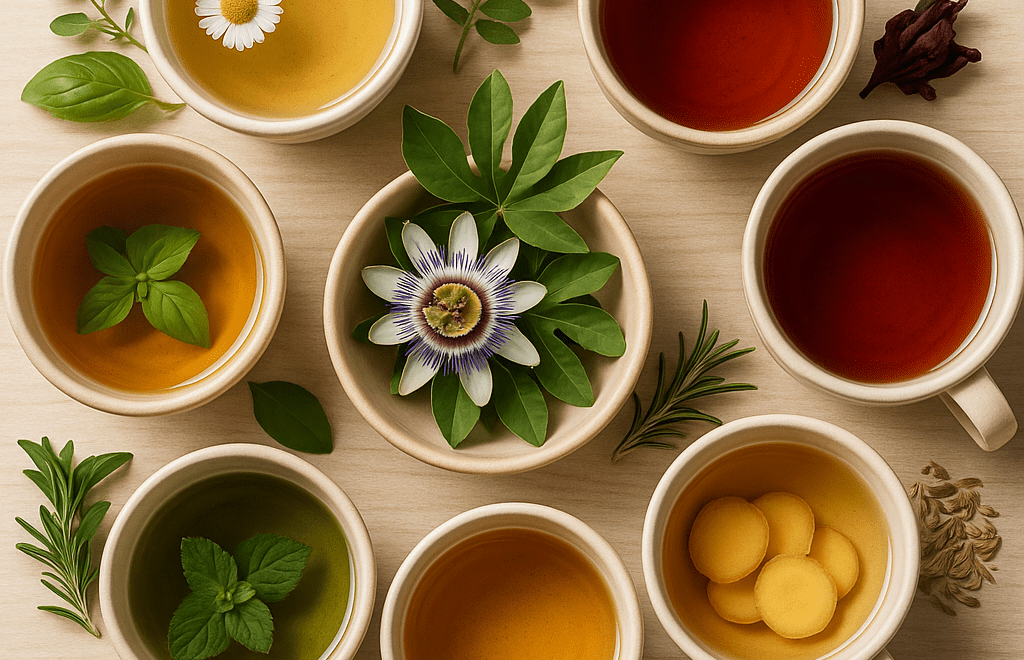
Herbal teas have been used for centuries to support stress relief, better sleep, and smoother digestion. Whether you’re dealing with a hectic day, restless nights, or an unsettled stomach, there’s a natural brew that can help. In this guide, we explore the best herbal teas for stress, sleep, and digestion.
Why Choose Herbal Tea?
Unlike caffeinated teas or sugary drinks, herbal teas are naturally free from caffeine and packed with plant-based compounds that offer calming and healing properties. They’re easy to prepare, widely available, and make a gentle addition to your self-care routine. Many are also popular natural remedies for anxiety, bloating, and gut health.
Best Herbal Teas for Stress Relief
1. Chamomile Tea
Chamomile is one of the most well-known herbs for stress and anxiety. It contains apigenin, an antioxidant that binds to receptors in the brain to promote calmness and reduce tension.
✅ Promotes relaxation
✅ Can help reduce mild anxiety
✅ Suitable for daily use
📖 Learn more about chamomile and its calming effects
2. Lemon Balm Tea
Lemon balm (Melissa officinalis) is a member of the mint family known for its soothing effects on the nervous system. Studies show it may help ease symptoms of stress and boost mood.
✅ Helps reduce cortisol levels
✅ Supports cognitive function
✅ Mild, lemony flavour
3. Passionflower Tea
Passionflower increases levels of gamma-aminobutyric acid (GABA) in the brain, which can reduce anxiety and promote relaxation. It’s particularly helpful for racing thoughts and sleep issues caused by stress.
✅ Supports calm and mental stillness
✅ Helps with anxiety-related insomnia
✅ Earthy, slightly grassy taste
4. Ashwagandha Tea
Ashwagandha is an adaptogenic herb that helps balance cortisol levels, making it ideal for managing chronic stress and improving resilience.
✅ Balances stress hormones
✅ May improve energy and mood
✅ Earthy, bitter flavour – often blended with warming spices
5. Holy Basil (Tulsi) Tea
Used in Ayurveda for centuries, Tulsi supports the body’s natural response to stress and enhances digestive and immune function.
✅ Caffeine-free and adaptogenic
✅ Supports balanced mood and focus
✅ Clove-like aroma with hints of pepper
Best Herbal Teas for Sleep Support
6. Valerian Root Tea
Valerian root is a natural sedative herb used to improve sleep quality and reduce the time it takes to fall asleep. It’s often recommended for people who struggle with insomnia.
✅ Naturally promotes restful sleep
✅ May reduce night-time waking
❗ Best used occasionally due to strong effects
7. Lavender Tea
Lavender is well-known for its aromatherapeutic benefits, but it’s equally effective as a tea. It helps reduce heart rate, lower blood pressure, and calm the nervous system before bedtime.
✅ Reduces restlessness
✅ Calms the mind
✅ Light floral taste
Best Herbal Teas for Digestion
8. Peppermint Tea
Peppermint tea is a go-to remedy for indigestion, bloating, and gas. Its natural oils help relax the digestive tract muscles, allowing trapped gas to pass and easing stomach discomfort.
✅ Soothes the gut
✅ Relieves bloating and cramps
✅ Fresh, cooling flavour
9. Ginger Tea
Ginger has long been used as a remedy for nausea, indigestion, and inflammation. It stimulates digestive enzymes and promotes movement through the digestive tract.
✅ Reduces nausea
✅ Supports digestion after meals
✅ Slightly spicy, warming taste
10. Fennel Tea
Fennel seeds help relieve constipation, gas, and bloating. They also have antispasmodic properties that ease stomach cramps and support overall digestive health.
✅ Mildly sweet flavour
✅ Supports healthy digestion
✅ Traditionally used in Ayurvedic medicine
11. Rooibos Tea
Rooibos is a caffeine-free herbal tea from South Africa rich in antioxidants. It supports gut health and has a calming effect on the nervous system.
✅ Supports digestion and reduces inflammation
✅ Promotes relaxation without drowsiness
✅ Naturally sweet, earthy taste
Tips for Brewing the Perfect Herbal Tea
- Use freshly boiled water for maximum infusion.
- Steep covered for at least 5–10 minutes (longer for roots like ginger or valerian).
- Drink 20–30 minutes before bed (for sleep teas) or after meals (for digestion teas).
- Passionflower, valerian, and ashwagandha may cause drowsiness; avoid before driving.
- Always check for allergies or medication interactions, especially with stronger herbs.
Common Side Effects and Precautions
- Valerian Root: May cause drowsiness or dizziness; avoid alcohol and driving.
- Peppermint: Can worsen acid reflux in some individuals.
- Ginger: High doses may thin blood or interact with anticoagulant medications.
- Pregnancy/Breastfeeding: Consult a healthcare provider before consuming herbal teas like valerian, ashwagandha, or passionflower.
Incorporating herbal teas for stress, sleep, and digestion into your daily routine is a simple yet powerful way to support your overall well-being. Whether you’re sipping chamomile to unwind after work or drinking ginger tea to ease your stomach after dinner, these natural remedies offer comfort in every cup.





